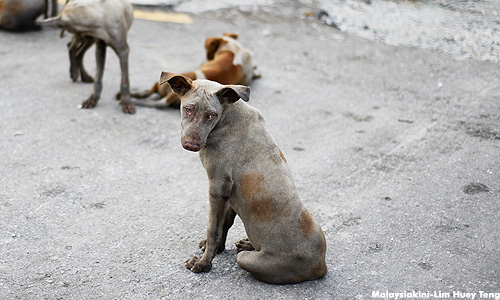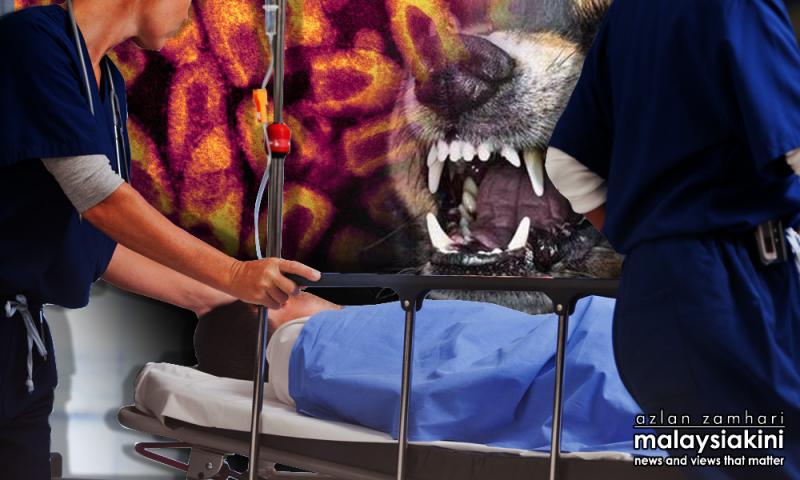COMMENT | Many leaders, including cabinet ministers, are making statements saying that the rabies outbreak is under control. When such statements are made, people tend to be complaisant and forget the precautionary measures that we have advised them.
The latest uproar and commotion in Parliament is a sad state of affairs. Time should be allocated to allow the matter to be questioned, debated and clarified.
The rabies outbreak is a national crisis. It is an epidemic in Sarawak, where many parts of its southern region are affected. It is getting worse as the deadly disease spread is entering the city’s gate.
In reality, rabies is not under control. It is still spreading and has become an epidemic. Each day new areas are declared to be infected. Detection of dogs commonly called “mad dogs” is still taking place in villages.
Yesterday, in Kampung Paun Sungai Rimu, my village and the village of the first two victims of the disease, a wild “mad dog” was spotted. The village folk attempted to hunt it down but it ran and disappeared into the wild.
Two pet dogs, previously injected with the rabies vaccine were killed as they were suspected of suffering from rabies. The pet dogs became sick and violent, attempting to bite their master, a symptom of the disease.
 It is now “dog mating” season and we can expect dogs running wild and increasing in numbers. Are we taking the phenomena into account and taking measures to address this potential health hazard?
It is now “dog mating” season and we can expect dogs running wild and increasing in numbers. Are we taking the phenomena into account and taking measures to address this potential health hazard?
We have to admit that there are weaknesses in our management of the crisis. We must have the gut to admit our failures. Only then can we move forward effectively.
It is said that the disease originated from Kalimantan, Indonesia. Some living in frontier villages claimed to have noticed stray “mad dogs” earlier in the year. The disease is said to have claimed lives across the border much earlier. There is, therefore, a failure on the coordination system between our health authorities and the neighbouring country.
The border is porous for both humans and animals. There are hundreds or thousands of workers from Kalimantan working in plantations and other fields. Many come and go and “pets” follow their masters.
Measures taken must be upgraded
With the serious outbreak, with newly affected areas declared in as many days, the authorities are urged to upgrade the measures that are being taken.
A crisis management team, working round-the-clock may need to be set up. International health organisations may be needed to assist and advice.
The team should have dedicated “spokespersons”, lest we make conflicting statements. Sadly this has happened. The situation escalated and “burst” in Parliament.
Locally, how do we enhance our rabies outbreak management? I would suggest the following measures to be taken at the village level, in addition to the many excellent initiatives that have been introduced by the authorities.
Firstly, we may have to advise the people to minimise their movements, particularly making unnecessary visits to friends. This is to minimise the risk of getting bitten by a friend’s dog.
Secondly, we may need to advise people to temporarily avoid organising big gatherings and celebrations in villages. Organising events would mean involving guests from other villages and locations. Pet dogs tend to be fierce to strangers.
Thirdly, children should be accompanied by mature or adult people while walking around in the village, especially while walking in the evening or night. They should be under watchful eyes when playing. Lights are to be carried at night to detect dogs that may be on their path.
All walking trails and foot paths in villages should be cleared on both sides to avoid dogs lurking among tall grass or bushes.
The village development committees (JKKK) are to be alerted to be more vigilant. JKKKs should closely work with all the relevant authorities in curbing this outbreak.
Let us hope that rabies will be really controlled soon. We hope to hear no more new areas affected.
EDWARD ANDREW LUWAK is chairperson of the DAP Serian branch, Sarawak.


